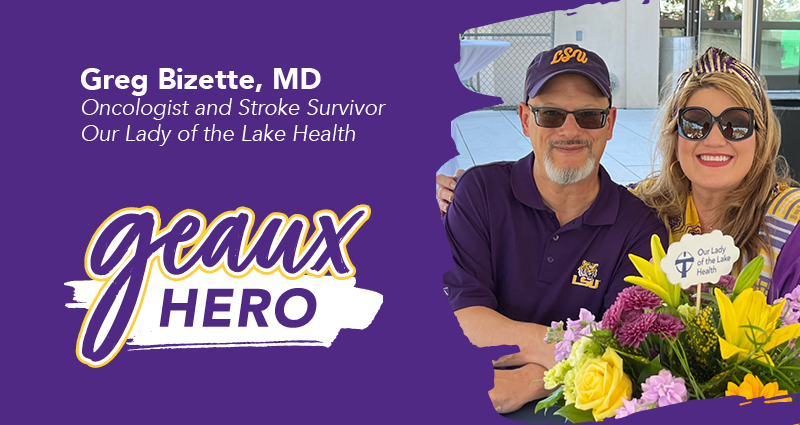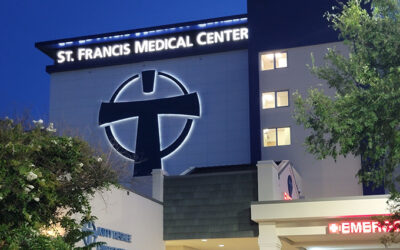As a cancer doctor, Greg Bizette, MD, has spent his career helping patients face their toughest days. But just days after turning 60, he found himself on the other side of the hospital hallway, this time, as the patient.
A week and a half before Dr. Bizette celebrated his birthday on March 5, he had a calcium score test, just to be proactive.
“Perfect score of zero,” he says. “Having a stroke was the last thing I was expecting.”
Doctor Becomes the Patient
Dr. Bizette commutes to Our Lady of the Lake Cancer Institute from Madisonville and often stays in Baton Rouge during the week to make work easier. The morning of March 10 seemed like any other. He parked, walked in and took the elevator to his office. That’s when things started feeling off.
“I stood up, and it was a strange deal. The first thing I thought was maybe an inner ear issue, but I hadn’t been sick,” he says. “I sat down, drank some water, just waited to see if it would pass.”
At first, everything seemed fine. Dr. Bizette’s speech and reflexes were normal, and he went about prepping for the day. But when he tried to stand again, things changed.
“I clutched the desk just to stay upright. That’s when I knew. This wasn’t nothing. I remember thinking, ‘If there’s something to this, we’re going to the ER.’”
As luck would have it, that’s when Gerald Miletello, MD, one of Dr. Bizette’s partners, walked in.
“He took one look at me and said, ‘You’re joking, right?’ I told him, ‘I’m not going to stay on my feet much longer.’ We got a wheelchair, and he brought me straight to the ER.”
Swift Action
Once at the emergency department, everything moved fast. Even though Dr. Bizette didn’t present with all the typical stroke symptoms — his thinking was clear and nothing looked obviously wrong on the scans — the Our Lady of the Lake Comprehensive Stroke Center team didn’t miss a beat.
“I was lucky, and the critical care team was incredible,” he says.
From there, it all happened quickly. An MRI confirmed what they needed to see. Dr. Bizette was having a stroke. The clot-busting medication was administered and within 40 minutes he was already feeling a difference.
Laura Knight, PA, critical care physician assistant with the stroke team, pushed the life-saving medicine.
“I didn’t even make it off the stretcher before they pushed the drug. And the change was incredible,” he says. “Laura never left me.”
On Adjusting After the Stroke
Dr. Bizette describes how loved ones understandably became overprotective. His daughter would worry watching him carry a plate to the dishwasher.
“Your family’s natural tendency is to put you in bubble wrap,” he says. Despite their concern, he knew he had to regain independence to truly recover.
“You really can’t allow yourself or them to fall into that trap … The only reason to do all this is to actually get back.”
That return included therapy at Our Lady of the Lake Hearing and Balance Center, where he worked with Monica Gvoich Moss, DPT, who helped him build confidence in every step.
The outpouring of support was unexpected but deeply moving.
“I’m stunned at the number of people who’ve approached me, patients, friends, colleagues, saying they’ve been praying for me,” Dr. Bizette says.
Back to What Matters Most
Incredibly, Dr. Bizette missed just one week of work. He returned part-time for two weeks and was soon back to caring for his patients full-time, right where he wanted to be.
Before the MRI that found his stroke, he said a quiet prayer, not just for healing, but for purpose. He prayed to get back to work and to his patients. For a man who’s spent decades walking alongside others in their most vulnerable moments, the drive to return wasn’t just professional. It was personal.
Because for Dr. Bizette, healing others isn’t just what he does. It’s who he is.
On April 25, Dr. Bizette will be honored as one of Our Lady of the Lake’s Geaux Heroes during LSU Baseball’s game against Tennessee, a moment that celebrates his strength, his service and the team who helped him heal.
His story is one of fast action, answered prayers and a calling too strong to keep him away for long, back where he belongs, alongside his patients.




